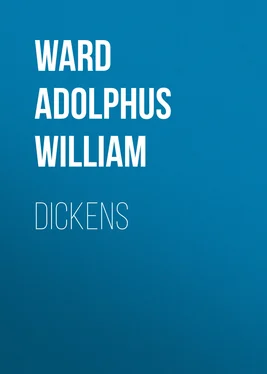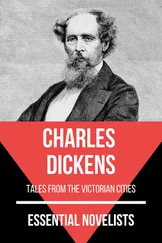Adolphus Ward - Dickens
Здесь есть возможность читать онлайн «Adolphus Ward - Dickens» — ознакомительный отрывок электронной книги совершенно бесплатно, а после прочтения отрывка купить полную версию. В некоторых случаях можно слушать аудио, скачать через торрент в формате fb2 и присутствует краткое содержание. Жанр: Биографии и Мемуары, foreign_antique, на английском языке. Описание произведения, (предисловие) а так же отзывы посетителей доступны на портале библиотеки ЛибКат.
- Название:Dickens
- Автор:
- Жанр:
- Год:неизвестен
- ISBN:нет данных
- Рейтинг книги:5 / 5. Голосов: 1
-
Избранное:Добавить в избранное
- Отзывы:
-
Ваша оценка:
- 100
- 1
- 2
- 3
- 4
- 5
Dickens: краткое содержание, описание и аннотация
Предлагаем к чтению аннотацию, описание, краткое содержание или предисловие (зависит от того, что написал сам автор книги «Dickens»). Если вы не нашли необходимую информацию о книге — напишите в комментариях, мы постараемся отыскать её.
Dickens — читать онлайн ознакомительный отрывок
Ниже представлен текст книги, разбитый по страницам. Система сохранения места последней прочитанной страницы, позволяет с удобством читать онлайн бесплатно книгу «Dickens», без необходимости каждый раз заново искать на чём Вы остановились. Поставьте закладку, и сможете в любой момент перейти на страницу, на которой закончили чтение.
Интервал:
Закладка:
Of these two passions he could always, as a child and as a man, be “happy with either,” and occasionally with both at the same time. In his tender years he was taken by a kinsman, a Sandhurst cadet, to the theatre, to see the legitimate drama acted, and was disillusioned by visits behind the scenes at private theatricals; while his own juvenile powers as a teller of stories and singer of comic songs (he was possessed, says one who remembers him, of a sweet treble voice) were displayed on domestic chairs and tables, and then in amateur plays with his school-fellows. He also wrote a—not strictly original—tragedy, which is missing among his Reprinted Pieces . There is nothing unique in these childish doings, nor in the circumstance that he was an eager reader of works of fiction; but it is noteworthy that chief among the books to which he applied himself, in a small neglected bookroom in his father’s house, were those to which his allegiance remained true through much of his career as an author. Besides books of travel, which he says had a fascination for his mind from his earliest childhood, besides the “Arabian Nights” and kindred tales, and the English Essayists, he read Fielding and Smollett, and Cervantes and Le Sage, in all innocence of heart, as well as Mrs. Inchbald’s collection of farces, in all contentment of spirit. Inasmuch as he was no great reader in the days of his authorship, and had to go through hard times of his own before, it was well that the literature of his childhood was good of its kind, and that where it was not good it was at least gay. Dickens afterwards made it an article of his social creed that the imagination of the young needs nourishment as much as their bodies require food and clothing; and he had reason for gratefully remembering that at all events the imaginative part of his education had escaped neglect.
But these pleasant early days came to a sudden end. In the year 1821 his family returned to London, and soon his experiences of trouble began. Misfortune pursued the elder Dickens to town, his salary having been decreased already at Chatham in consequence of one of the early efforts at economical reform. He found a shabby home for his family in Bayham Street, Camden Town; and here, what with the pecuniary embarrassments in which he was perennially involved, and what with the easy disposition with which he was blessed by way of compensation, he allowed his son’s education to take care of itself. John Dickens appears to have been an honourable as well as a kindly man. His son always entertained an affectionate regard for him, and carefully arranged for the comfort of his latter years; nor would it be fair, because of a similarity in their experiences, and in the grandeur of their habitual phraseology, to identify him absolutely with the immortal Mr. Micawber. Still less, except in certain details of manner and incident, can the character of the elder Dickens be thought to have suggested that of the pitiful “Father of the Marshalsea,” to which prison, almost as famous in English fiction as it is in English history, the unlucky navy-clerk was consigned a year after his return to London.
Every effort had been made to stave off the evil day; and little Charles, whose eyes were always wide open, and who had begun to write descriptive sketches of odd personages among his acquaintance, had become familiar with the inside of a pawnbroker’s shop, and had sold the paternal “library” piecemeal to the original of the drunken second-hand bookseller, with whom David Copperfield dealt as Mr. Micawber’s representative. But neither these sacrifices nor Mrs. Dickens’s abortive efforts at setting up an educational establishment had been of avail. Her husband’s creditors would not give him time; and a dark period began for the family, and more especially for the little eldest son, now ten years old, in which, as he afterwards wrote, in bitter anguish of remembrance, “but for the mercy of God, he might easily have become, for any care that was taken of him, a little robber or a little vagabond.”
Forster has printed the pathetic fragment of autobiography, communicated to him by Dickens five-and-twenty years after the period to which it refers, and subsequently incorporated with but few changes in the Personal History of David Copperfield . Who can forget the thrill with which he first learned the well-kept secret that the story of the solitary child, left a prey to the cruel chances of the London streets, was an episode in the life of Charles Dickens himself? Between fact and fiction there was but a difference of names. Murdstone & Grinby’s wine warehouse down in Blackfriars was Jonathan Warren’s blacking warehouse at Hungerford Stairs, in which a place had been found for the boy by a relative, a partner in the concern; and the bottles he had to paste over with labels were in truth blacking-pots. But the menial work and the miserable pay, the uncongenial companionship during worktime, and the speculative devices of the dinner-hour were the same in each case. At this time, after his family had settled itself in the Marshalsea, the haven open to the little waif at night was a lodging in Little College Street, Camden Town, presenting even fewer attractions than Mr. Micawber’s residence in Windsor Terrace, and kept by a lady afterwards famous under the name of Mrs. Pipchin. His Sundays were spent at home in the prison. On his urgent remonstrance—“the first I had ever made about my lot”—concerning the distance from his family at which he was left through the week, a back attic was found for him in Lant Street, in the Borough, “where Bob Sawyer lodged many years afterwards;” and he now breakfasted and supped with his parents in their apartment. Here they lived in fair comfort, waited upon by a faithful “orfling,” who had accompanied the family and its fortunes from Chatham, and who is said by Forster to have her part in the character of the Marchioness. Finally, after the prisoner had obtained his discharge, and had removed with his family to the Lant Street lodgings, a quarrel occurred between the elder Dickens and his cousin, and the boy was in consequence taken away from the business.
He had not been ill-treated there; nor indeed is it ill-treatment which leads to David Copperfield’s running away in the story. Nevertheless, it is not strange that Dickens should have looked back with a bitterness very unusual in him upon the bad old days of his childish solitude and degradation. He never “forgot” his mother’s having wished him to remain in the warehouse; the subject of his employment there was never afterwards mentioned in the family; he could not bring himself to go near old Hungerford Market so long as it remained standing; and to no human being, not even to his wife, did he speak of this passage in his life until he narrated it in the fragment of autobiography which he confided to his trusty friend. Such a sensitiveness is not hard to explain; for no man is expected to dilate upon the days “when he lived among the beggars in St. Mary Axe,” and it is only the Bounderbies of society who exult, truly or falsely, in the sordid memories of the time before they became rich or powerful. And if the sharp experiences of his childhood might have ceased to be resented by one whom the world on the whole treated so kindly, at least they left his heart unhardened, and helped to make him ever tender to the poor and weak, because he too had after a fashion “eaten his bread with tears” when a puny child.
A happy accident having released the David Copperfield of actual life from his unworthy bondage, he was put in the way of an education such as at that time was the lot of most boys of the class to which he belonged. “The world has done much better since in that way, and will do far better yet,” he writes at the close of his description of Our School , the “Wellington House Academy,” situate near that point in the Hampstead Road where modest gentility and commercial enterprise touch hands. Other testimony confirms his sketch of the ignorant and brutal head-master; and doubtless this worthy and his usher, “considered to know everything as opposed to the chief who was considered to know nothing,” furnished some of the features in the portraits of Mr. Creakle and Mr. Mell. But it has been very justly doubted by an old school-fellow whether the statement “We were First Boy” is to be regarded as strictly historical. If Charles Dickens, when he entered the school, was “put into Virgil,” he was not put there to much purpose. On the other hand, with the return of happier days had come the resumption of the old amusements which were to grow into the occupations of his life. A club was founded among the boys at Wellington House for the express purpose of circulating short tales written by him, and he was the manager of the private theatricals which they contrived to set on foot.
Читать дальшеИнтервал:
Закладка:
Похожие книги на «Dickens»
Представляем Вашему вниманию похожие книги на «Dickens» списком для выбора. Мы отобрали схожую по названию и смыслу литературу в надежде предоставить читателям больше вариантов отыскать новые, интересные, ещё непрочитанные произведения.
Обсуждение, отзывы о книге «Dickens» и просто собственные мнения читателей. Оставьте ваши комментарии, напишите, что Вы думаете о произведении, его смысле или главных героях. Укажите что конкретно понравилось, а что нет, и почему Вы так считаете.












